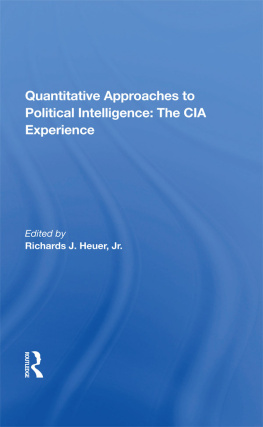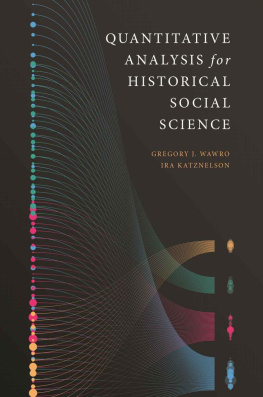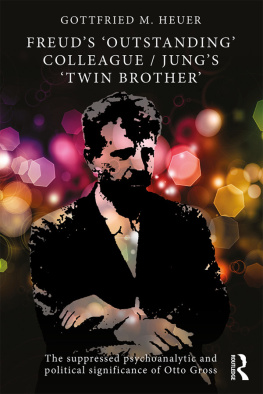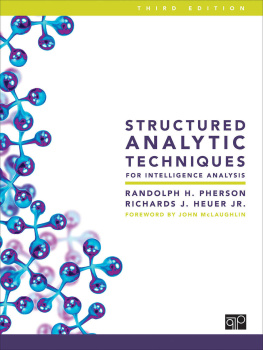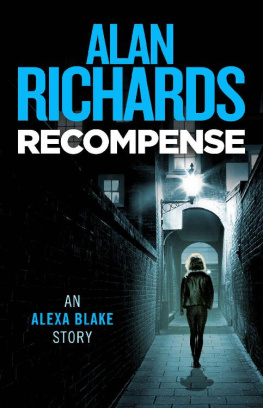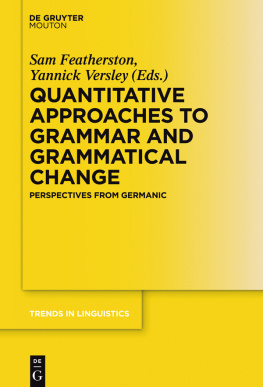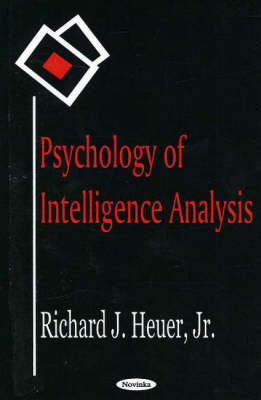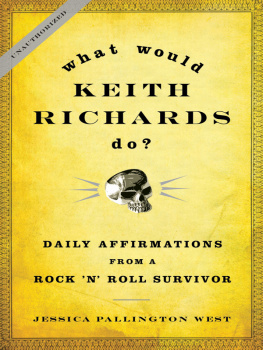Quantitative Approaches to Political Intelligence: The CIA Experience
Other Titles of Interest
Presidents, Secretaries of State, and Crises in U.S. Foreign Relations , Lawrence Falkowski
U.S. Intelligence and the Soviet Strategic Threat , Lawrence Freedman
Process of Priority Formulation , Dan Haendel
Crisis Resolution: Presidential Decision Making in the Mayaguez and Korean Confrontations , Richard G. Head, Frisco W. Short, and Robert C. McFarlane
Analyzing Soviet Strategic Arms Decisions , Karl F. Spielmann
A Westview Special Study
Quantitative Approaches to Political Intelligence: The CIA Experience
edited by Richards J. Heuer, Jr.
Bridging the gap between the scientific approach to international relations and the intuitive analysis of the government foreign affairs specialist, this book reports on a concerted effort by the CIA to apply modern social science methods to problems confronted by political intelligence analysts. The unique experience gained through this CIA program holds lessons for both the scholar and the practitioner of international relations. The studies collected here demonstrate to the government analyst that systematic methods can be relevant to his needs, and show the social scientist that his skills can be applied to problems of direct interest to the foreign policy community. The book evolved from a panel presented at the Eighteenth Annual Convention of the International Studies Association in St. Louis in March 1977. The first chapter discusses the CIAs overall experience in applying quantitative methods of political analysis; seven subsequent chapters report on applications of specific methods as diverse as regression analysis, multidimensional scaling, Bayesian statistics, and cross-impact analysis.
Richards J. Heuer, Jr., is chief of the Methods and Forecasting Division of the CIAs Office of Regional and Political Analysis. He has had over twenty-seven years of experience with the CIA and received his M.A. in international relations from the University of Southern California.
First published 1978 by Westview Press
Published 2019 by Routledge
52 Vanderbilt Avenue, New York, NY 10017
2 Park Square, Milton Park, Abingdon, Oxon OX14 4RN
Routledge is an imprint of the Taylor & Francis Group, an informa business
Copyright 1978 Taylor & Francis
All rights reserved. No part of this book may be reprinted or reproduced or utilised in any form or by any electronic, mechanical, or other means, now known or hereafter invented, including photocopying and recording, or in any information storage or retrieval system, without permission in writing from the publishers.
Notice:
Product or corporate names may be trademarks or registered trademarks, and are used only for identification and explanation without intent to infringe.
Library of Congress Cataloging in Publication Data
Main entry unter title:
Quantitative approaches to political intelligence.
(A Westview special study)
1. United States. Central Intelligence Agency. 2. Intelligence service-United
States. 3. Social science research. I. Heuer, Richards j.
JK468.16Q36 327,120182 8-3781
ISBN 13: 978-0-367-28489-3 (hbk)
Scholars who emphasize the scientific approach to the study of international phenomena commonly despair of having their voices heard in the councils of government, while most government analysts are equally pessimistic that anything useful will come from what they regard as the pseudo-scientific endeavors favored by many academic political scientists. This book is intended for both scholars and government analysts of international relations, but especially for those who are concerned with bridging the gap between the two.
The common ground between scientist and government analyst has not been well developed. The studies collected together here are the fruits of a concerted effort by the Central Intelligence Agency to apply modern social science methods to problems of concern to political intelligence analysts. By bringing together a number of examples of our work under one cover, I hope to demonstrate to the government analyst that systematic methods can be relevant to his needs, and to encourage the scientist to apply his skills to problems of direct interest to the foreign policy community.
seven chapters report on specific applications of various methods. Although several of the studies were written specifically for a nongovernment audience, all report on official work done for CIA. As is our habit, all authors have striven to avoid methodological jargon, writing so as to be understood by the informed layman with little or no quantitative training.
This volume grows out of a panel with the same title presented at the Eighteenth Annual Convention of the International Studies Association at St. Louis in March 1977. Four papers were presented to the academic community on that occasion as a sort of progress report on our efforts. Strong encouragement from our academic colleagues and the initiative of the publisher have now resulted in the revised and expanded work presented here.
It is not feasible to acknowledge by name all those who made this research possible, who contributed to it, or who helped to prepare the manuscript. Suffice it to say that it was a group effort, but that any deficiencies in what follows are obviously my own responsibility.
Richards J. Heuer, Jr.
Quantitative Approaches to Political Intelligence: The CIA Experience
1
Adapting Academic Methods and Models to Governmental Needs
Richards J. Heuer, Jr.
In response to a policy directive by CIA director William Colby to experiment with the application of what are, for CIA, unconventional methods of political analysis, small methodology staffs were established in the summer and fall of 1973 in the two CIA offices dealing primarily with political analysis. Although CIA has been innovative in the application of new methodologies in other fields, e.g., economic modeling of Soviet defense expenditures and information storage and retrieval, to name but two of many fields, the behavioral revolution in academic political science has been virtually ignored by the Agency and the intelligence community as a whole.
A reorganization in December 1976 combined the two methodology units and their parent offices into what is now the Methods and Forecasting Division of the Office of Regional and Political Analysis (ORPA). The Methods and Forecasting Division is charged with studying analytical techniques employed by academia and industry, and then testing, adapting, and applying selected techniques to the needs of the political intelligence analyst. These are largely, but not exclusively, quantitative or computer-based procedures.
The product of the divisions efforts is disseminated throughout the intelligence and foreign affairs community in the same manner as other intelligence reports. It is in this respect unique within the community, since other quantitative political research done for the State and Defense Departments, as well as for CIA, has normally been handled at the research and development level, i.e., contracted out, with the results often enjoying greater dissemination and acceptance outside of government than within it. Neither the State nor Defense Department has a methodology component integrated into the day-by-day political intelligence production process. Even at CIA we have made but a small beginning.

